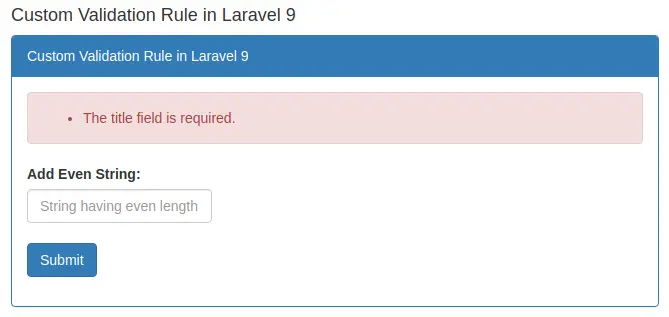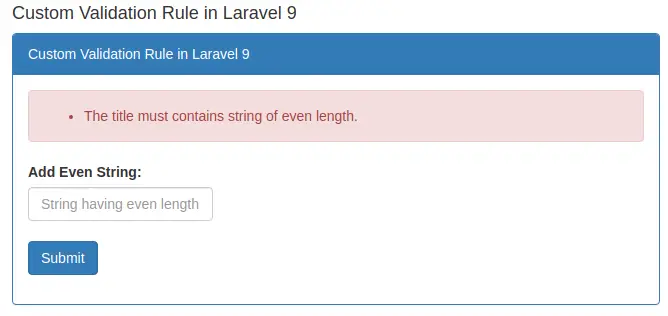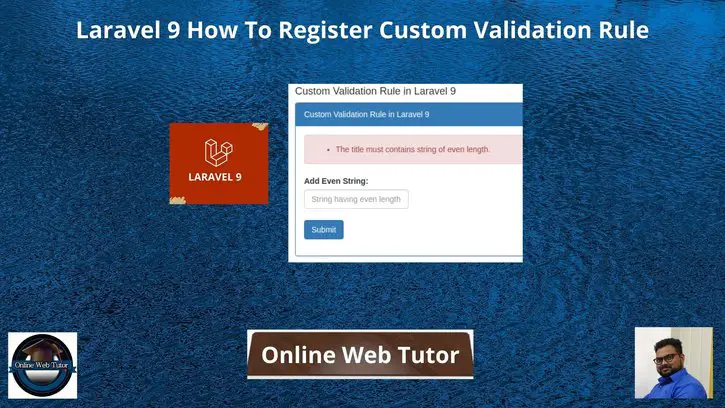Inside this article we will see the concept i.e Laravel 9 How To Register Custom Validation Rule. Article contains classified information about custom rules in laravel 9.
If you are looking for an article which helps you to understand about custom validation rules in laravel 9 then you are right place to get the concept.
Laravel 9 by default provides many validation rules to validate user inputs either for string value, integer value, etc. But in several cases we need custom rules. In this tutorial we will register validation rule.
Learn More –
- JQuery Ajax Form Validation in Laravel 9 Tutorial
- Laravel 9 Add Social Media Share Buttons Tutorial
- Laravel 9 Authentication Scaffolding with Breeze Tutorial
- Laravel 9 Authentication using Jetstream with Inertia Js
Let’s get started.
Laravel Installation
Open terminal and run this command to create a laravel project.
composer create-project laravel/laravel myblogIt will create a project folder with name myblog inside your local system.
To start the development server of laravel –
php artisan serveURL: http://127.0.0.1:8000
Assuming laravel already installed inside your system.
Create Controller
Open project into terminal and run this artisan command.
$ php artisan make:controller CustomFormControllerIt will create CustomFormController.php file inside /app/Http/Controllers folder.
Open CustomFormController.php and write this complete code into it.
<?php
namespace App\Http\Controllers;
use Illuminate\Http\Request;
class CustomFormController extends Controller
{
// form view
public function myform()
{
return view('myform');
}
// form submit function
public function formSubmit(Request $request)
{
$this->validate($request, [
'title' => 'required|is_odd_string',
]);
dd('Form Submitted');
}
}
required is defined rule in laravel, is_odd_string is a custom validation rule.
Add Routes
Open web.php from /routes folder. Add these routes into it.
use App\Http\Controllers\CustomFormController;
//...
Route::get('my-form', [CustomFormController::class, "myform"]);
Route::post('form-submit', [CustomFormController::class, "formSubmit"]);
Register Custom Validation Rule
We will register is_odd_string custom validation rule.
Open AppServiceProvider.php from /app/Providers folder.
<?php
namespace App\Providers;
use Illuminate\Support\ServiceProvider;
use Validator;
class AppServiceProvider extends ServiceProvider
{
/**
* Register any application services.
*
* @return void
*/
public function register()
{
//
}
/**
* Bootstrap any application services.
*
* @return void
*/
public function boot()
{
Validator::extend('is_odd_string', function ($attribute, $value, $parameters, $validator) {
if (!empty($value) && (strlen($value) % 2) == 0) {
return true;
}
return false;
});
}
}
We have added custom validation rule in boot() method.
Add Validation Messages for Custom Rules
Open validation.php from /lang/en folder.
Add key value pairs for messages for custom validation rules.
<?php return [ //... 'is_odd_string' => "The :attribute must contains string of even length.", ];
Create Blade Template
Create view layout file myform.blade.php inside /resources/views folder.
<html lang="en">
<head>
<title>Custom Validation Rule in Laravel 9</title>
<link rel="stylesheet" href="https://maxcdn.bootstrapcdn.com/bootstrap/3.4.1/css/bootstrap.min.css">
</head>
<body>
<div class="container">
<h4>Custom Validation Rule in Laravel 9</h4>
<div class="panel panel-primary">
<div class="panel-heading">Custom Validation Rule in Laravel 9</div>
<div class="panel-body">
<form action="{{ URL::to('form-submit') }}" class="form-horizontal" method="post">
@csrf
@if (count($errors) > 0)
<div class="alert alert-danger">
<ul>
@foreach ($errors->all() as $error)
<li>{{ $error }}</li>
@endforeach
</ul>
</div>
@endif
<label for="">
Add Even String:
</label>
<input type="text" name="title" class="form-control" style="width:30%"
placeholder="String having even length" />
<br />
<button class="btn btn-primary">Submit</button>
</form>
</div>
</div>
</div>
</body>
</html>
Application Testing
Run this command into project terminal to start development server,
php artisan serveURL: http://127.0.0.1:8000/my-form
Submit form without any value

Submit form with odd string length

We hope this article helped you to Learn Laravel 9 How to Register Custom Validation Rule Tutorial in a very detailed way.
If you liked this article, then please subscribe to our YouTube Channel for PHP & it’s framework, WordPress, Node Js video tutorials. You can also find us on Twitter and Facebook.
